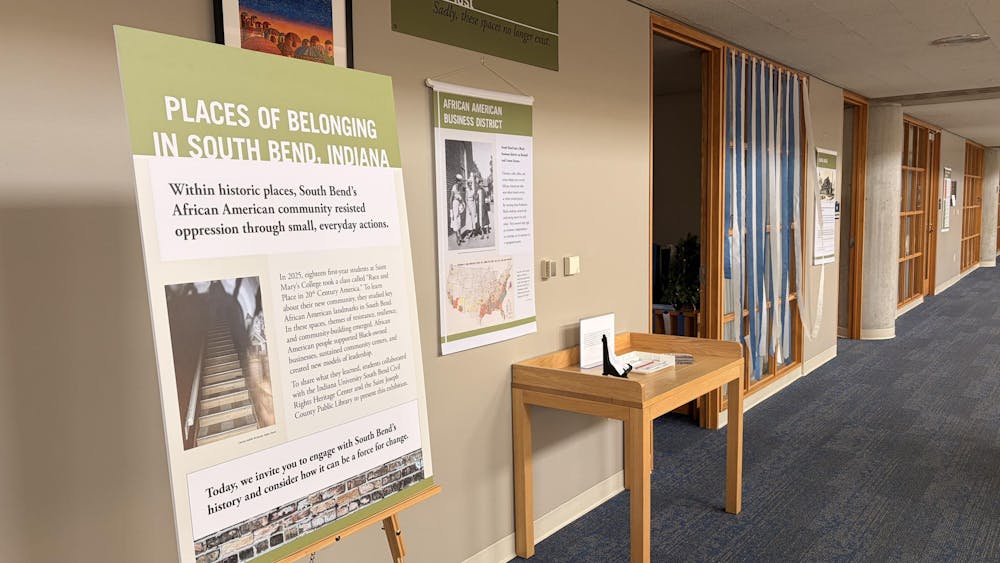Editor’s Note: This is the third article in an investigative series on the accessibility and effectiveness of mental health resources available within the tri-campus community.
Mourning the loss of a loved one can manifest in many ways, from missing classes for some to skipping meals for others. Grief and loss support groups in the tri-campus community have been established as an extension of mental health services for students during this time.
The Notre Dame grief and loss support group is offered for any student who has recently lost a loved one, a parent, sibling, friend or other family member, in order to help them in whatever way they need to handle their grief.
Tami Schmitz, associate director of pastoral care, said in an email that participants in the group find support from their peers so they can realize they are not alone. The group meets for four sessions over the duration of the semester, co-facilitated by a campus minister and counselor.
Similarly, Saint Mary’s Campus Ministry, in conjunction with Health and Counseling, hosts a grief and loss support group for students throughout the year.
The group is an informal, wide open experience for anybody who wants to come for whatever grief they are experiencing, said Regina Wilson, director of Campus Ministry and facilitator of the support group.
Wilson emphasized that the group is not only for students who have had some kind of death in their life, but is also open to anybody who has experienced any kind of grief associated with struggle or trauma in their life.
Making yourself vulnerable while grieving can be a challenge for many, like Madyson McDougal. The sophomore at Notre Dame said she found comfort in the support group while mourning the loss of her father earlier this year.
“Personally, it was kind of hard to first say that I needed help just because of who I am,” McDougal said. “I quickly got really close to the people there, and I’m very glad that I did that. I got to talk about what I was feeling and just hear from other people and know that they’re feeling the same things."
McDougal said she talked to many individuals on campus, including her rector and counselors, but found the grief and loss support group to be the most meaningful regarding her mental health.
Schmitz said religion and spirituality are often used as an anchor to cope with mortality.
“Death and loss are some of the most challenging times, and we are there to accompany each student and give them a space to grieve while also offering the support and comfort that is part of our Catholic faith,” she said. “We know that during times of loss, our faith can be shaken, but we also know it often times helps us get through those times.”
Being a Catholic university, Catholicism is the base of the structure of the groups, but students of all faiths are welcome, Schmitz said.
“The underlying purpose of the group is a belief in the resurrection,” she said. “The motto of the Congregation of Holy Cross is ‘Hail the Cross, Our Only Hope.’ What that means is that even in our darkest times, we can find hope and meaning.”
Wilson said the group at Saint Mary’s is rooted in an idea that, as a people, we have a lot of things that affect us and our relationship with one another and with God. One of the more profound experiences that we have that affect our relationships with one another and God is death, Wilson said.
“It helps us that there is hope,and that we experience that new stuff, and when we are together, and we can tell our stories, and we know that God is present,” she said.
Wilson said she believes the ties between mental health, spirituality and grief are prevalent and under-discussed.
“Grief is natural,” she said. “There’s a natural response to loss and it affects all aspects of our lives, affects our relationship with God.”
Wilson said grief affects students’ ability to function physically, and also mentally, as students can have a hard time concentrating when feeling depressed or sad.
“This group is a very holistic approach in the sense that it really invites people to sit together, to pray together to talk together,” she said. “It’s not the full healing process, but it attempts to be part of the healing process.”
Schmitz said the loss of a loved one is among the most devastating things that can happen to people, especially students.
“It can be a time of isolation and truly feeling like they are totally alone. Meeting other students who have similar losses provides some comfort,” she said. “I have seen beautiful friendships form out of the group. They also give each other practical tips on how to navigate issues such as going for the holidays or keeping up in classes or dealing with roommates. I often find the group space is simply ‘sacred’ and allows for lots of emotions, support and a sense of belonging.”
Read More
Trending









